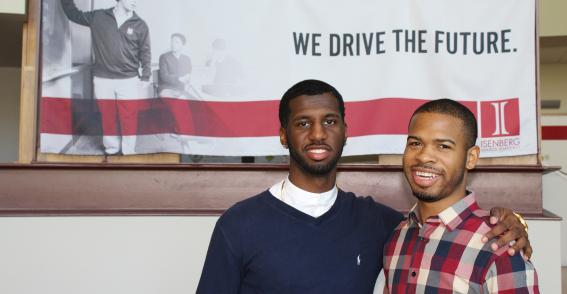Sport Management Graduate Drives Minority Mentorship Program at Isenberg
April 24, 2018

“Last summer, my alumni mentor, Melcolm Ruffin ’13, took me under his wing,” notes Isenberg McCormack Sport Management sophomore Davonté Higginbottom. “His insights on classes, club activities, and life advice have made a tremendous difference to me as a student and a person.” Sport Management junior Claudia Sam has similar praise for her alumni mentor, Tanya Downey ’14. “Tanya,” says Claudia, “has given me valuable advice on academics, out-of-classroom projects, and networking. Although our relationship dates to late January, I consider her more than a mentor. She’s really a life coach.”
“With the mentorship program, we become a more welcoming, supportive place for students from minority backgrounds.”Davonté and Claudia are enthusiastic participants in McCormack Sport Management’s Initiative for Underrepresented Students. Formally launched during the fall 2017 semester, the program currently pairs eleven Sport Management graduates and the department’s current McCormack students—all from minority backgrounds. The bottom line is to create a more inclusive environment both at McCormack and Isenberg, emphasizes Nefertiti Walker, a Sport Management professor who is Isenberg’s schoolwide Director of Diversity and Inclusion. “With the mentorship program, we become a more welcoming, supportive place for students from minority backgrounds and engage alumni from those backgrounds as well,” she remarks.
The initial impulse for the mentorship program, Walker explains, originated with a recent graduate—Melcolm Ruffin, Associate Manager for the NBA G League, the NBA's official minor league. A former student of Walker, Melcolm reached out to her, Sport Management professor Nicole Melton, and Communications, Events and Alumni Relations Coordinator Molly McGuigan with a comprehensive strategy to improve minority student inclusion. A supportive department chair, Janet Fink, agreed that a mentorship program was the best first-step in implementing Ruffin’s longer-term initiative, which also includes recruitment, scholarships, and career development dimensions.

Many students from minority backgrounds, Ruffin observes, face added challenges in both relocating and maximizing an Isenberg education. Moving considerable distances from home, adapting to an unfamiliar campus culture, challenging coursework, and career planning—all can prove daunting. Financial burdens are another potential game changer. That was evident to Ruffin when, as an involved alumnus, he spent considerable time and energy advising a promising high-school senior from Brooklyn on joining the Sport Management program. “In spite of our passionate commitment to inclusion, he went elsewhere because the other school offered him greater financial assistance,” Ruffin laments.
“After that, I asked myself, What am I going to do to help fix this?” he recalls. “So I spoke with other minority alumni—all passionate about giving—who helped me to come up with the four-prong strategic plan, including mentorships.” Many of those alumni, he adds, were themselves happy to participate as mentors. But it was crucial to match alumni to student interests and biographies.
Davonté Higginbottom and Melcolm, for example, both share a passion for basketball. “Like me, Melcolm served as a student manager with the men’s varsity team,” notes Davonté. Melcolm, he adds, was deeply involved with the student organization, Association for Diversity in Sport (ADS). “Through ADS, Melcolm created McCormack’s annual student career fair. I have served as its co-chair.” One notable difference between the two: Davonté is double majoring in accounting. This summer he will intern with a Big 4 Accounting firm, PricewaterhouseCoopers. But he is determined to marshal his skills—financial and nonfinancial—into a career in basketball management.
“We give our matches considerable thought. That’s because every student needs something different.” Claudia Sam and Tanya Downey are both deeply passionate about soccer and share a Latina heritage. (Tanya is Senior Coordinator for Partnership Marketing with Major League Soccer.) “I am from Westchester and Dominican; Tanya is from Texas and of Mexican heritage,” remarks Claudia. “We are both outgoing and she really understands and wants the best for me. It’s from the heart,” she emphasizes. To that end, “Tanya shared her personal background and what she went through. She has encouraged me to do things that set me apart and to always do the best I can.” One clear differentiator was meeting up with and learning from Tanya’s boss at a recent professional soccer sport leadership conference in New York City. At the conference, Claudia networked with industry professionals and attended keynote and breakout sessions, learning from on- and off-the-field leaders.
“For freshmen and sophomores, the new program strives to match mentors and students with similar areas of interest and cultural backgrounds,” explains Molly McGuigan, the department’s coordinator for communications, events, and alumni relations. For juniors and seniors, the match is more strategic, focusing on internships, career paths, and placements.” All mentors, she continues, are McCormack grads. Students make the first point of contact before they share face-time via skype with their mentors. “We give our matches considerable thought,” McGuigan continues. “That’s because every student needs something different.”
For Professor Walker, the new program has added value because she believes it will yield replicable, best practices. “And it’s the brainchild of an alumnus, who has considered minority inclusivity from every angle. That includes engaging our alumni as mentors and champions of our program. Many of those graduates, we hope, will send their own kids to Isenberg.”